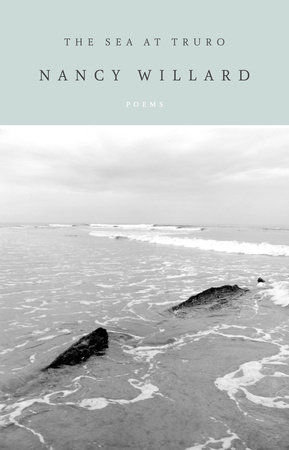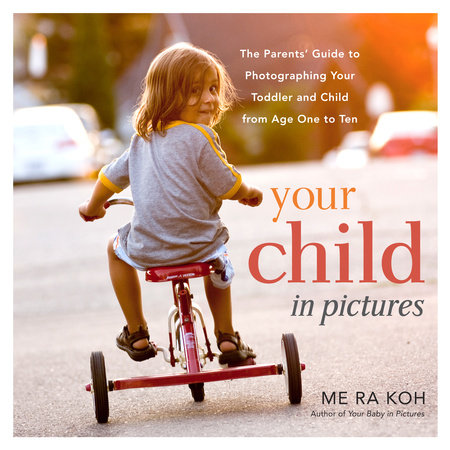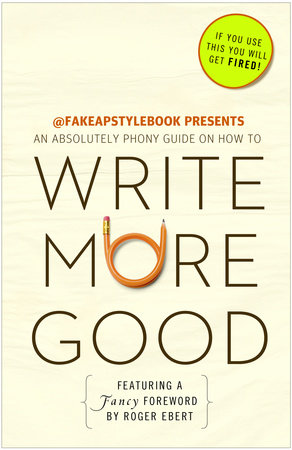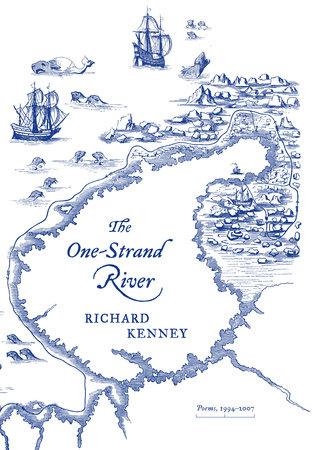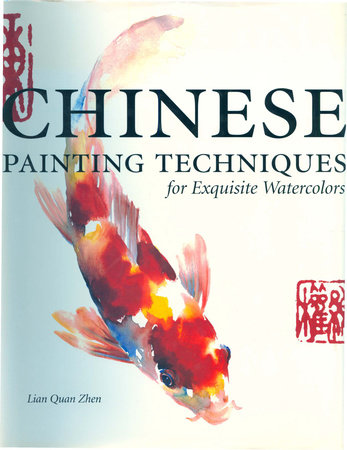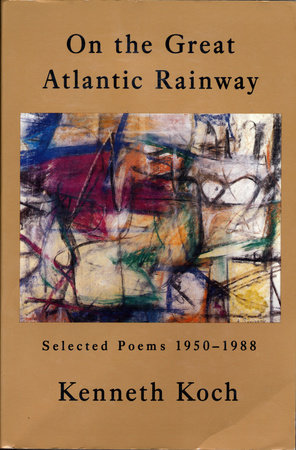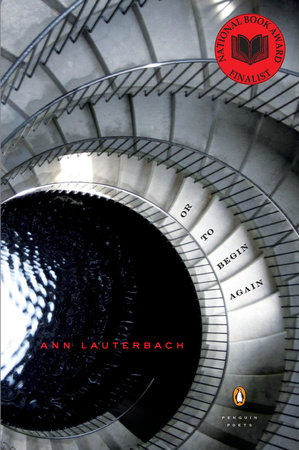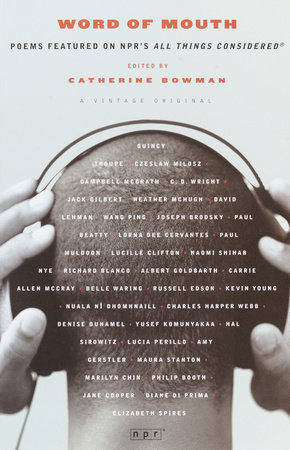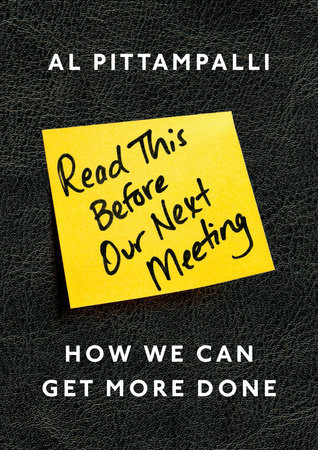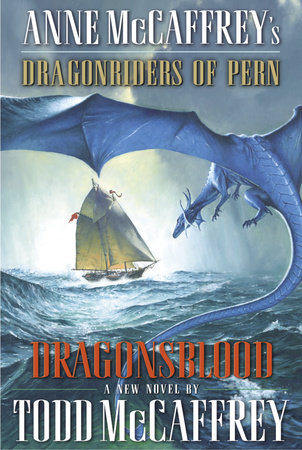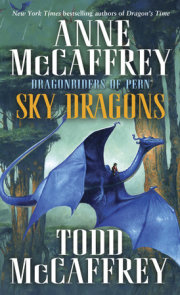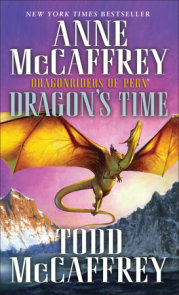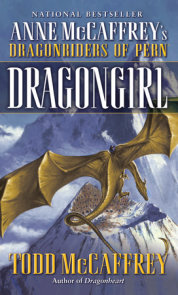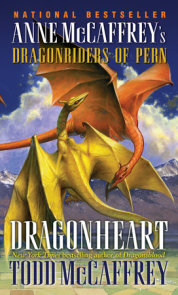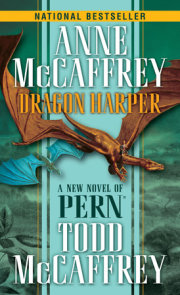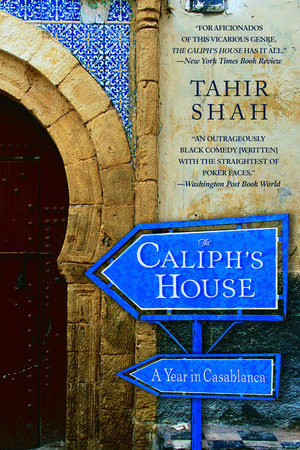Author Q&A
Interview Questions for Todd McCaffrey
DR: Your mother, Anne McCaffrey, has been writing about Pern for more than thirty-five years, creating some of the best-loved classics in science fiction. It’s probably inevitable, unfortunately, that some people will ascribe your authorship of this novel solely to your being her son. How would you respond to those people?
TM: I’d say to them, "Read the book, then let’s see if you still feel the same way."
DR: Did you feel any trepidation about trying to fill Anne’s literary shoes? How did you deal with the pressure of coming up to her high standard?
TM: Yes, I did feel a lot of trepidation. However, I’ve been researching for Mum for over twenty years now, and reading her for longer.
As for dealing with the pressure, it’s very difficult. It helped that I was the editor’s contact for Dragon’s Kin–I was relieved to see that not only were my words being edited, but so were Mum’s.
DR: Is Dragonsblood a passing of the torch from mother to son, or will Anne continue to write novels and stories set on Pern?
TM: It wasn’t intended to be a passing of the torch. I think writing more Pern novels is strictly up to Mum. But she’ll be seventy-nine this April, well past the point when other people have retired, and I don’t see why she shouldn’t rest on her vast accomplishments if she wants.
DR: What was it like to grow up with a famous writer for a mom? Did you always have the ambition to be a writer yourself?
TM: Fame is strictly relative. More people didn’t know Mum’s works than did. In science fiction and fantasy circles, Mum didn’t really break out as a "famous writer" until the publication of Dragonsong and "A Time When," in the mid-70’s–and she’d been writing since 1953.
I earned my first typewriter at the age of thirteen by teaching myself touch typing so I could write my stories. That said, I didn’t want to be a writer. I wanted to be an astronaut (doesn’t everyone?), but I expected to be writing as a sideline.
DR: How much was Pern a part of your childhood?
TM: Pern wasn’t part of my childhood because Mum didn’t write the first story until well into my late childhood. By the time I read "Weyr Search," the first part of Dragonflight, in Analog, I was nearly twelve. But Pern was part of my adolescence, as was attending science fiction conventions. I’d been reading Heinlein and Norton since I was nine, having discovered them in the school library (heredity?), so science fiction conventions were quite a welcome addition for me.
When Mum’s galleys–they call them "page proofs" nowadays–came in, we’d all sit around the kitchen table reading them, looking for typos and being "galley slaves." I was the first of her kids to get into science fiction, but as my little sister grew up, she became interested too. In fact, Gigi–rather, Georgeanne Kennedy–is the other person allowed to write in Mum’s worlds.
DR: You collaborated with your mother on a previous novel, Dragon’s Kin. What was that experience like, and was it a good preparation for taking flight on your own with this novel?
TM: Actually, I had started Dragonsblood a long time before Mum and I thought of writing Dragon’s Kin. And Mum and I had talked about collaborating long before Dragon’s Kin. We had tossed ideas back and forth about a collaboration after she’d finished All the Weyrs of Pern–ideas which she picked up and turned into The Skies of Pern.
DR: What did you learn from your mother about being a writer?
TM: I learned so much that it’s probably second nature to me. Simple things like how to prepare a manuscript, how to read copy-editor’s marks, and so on.
DR: In what ways are you and your mother similar as writers? In what ways are you different? What unique qualities does Todd McCaffrey bring to Dragonsblood?
TM: We’re both happiest when our characters come to life on the page, when they stand up and declare their own interests: "No, I won’t do that! I’ll do this."
I’m a trained mechanical engineer with a stint in the Army, a pilot’s license, and over two decades of software engineering behind me. I tend to think a lot more about the actual mechanics, the how-things-work side of things, than Mum does.
DR: Tell us a little bit about Dragonsblood. How much freedom did you have in terms of coming up with the story and characters?
TM: Dragonsblood started as a dream that woke me up in the middle of the night. I was trying to think of a good idea, and I wanted to answer some of the questions that hadn’t been answered in Mum’s books. For example, who made the Ancient Rooms in Benden Weyr, and why? I don’t think anyone but me–except possibly my sister–would ever have thought of those questions.
Of course, I had to research Dragonsdawn to be sure that I’d had my facts right–and in fact, I discovered a typo in the US edition of Dragonsdawn that says Wind Blossom is Kitti Ping’s granddaughter, whereas she is actually her daughter. I also researched Dragonflight and Dragonquest, as they related to the story.
Mum and I entered into a legal agreement over Dragonsblood. It’s her world, after all, and we both wanted to protect it and recognize her rights. So Mum had approval on both the original outline and on the final novel. On the outline, she had some concerns, and I answered them, and then she put a "smiley face" on the outline! On the novel, Mum and my sister were two of the first three readers and gave lots of important feedback.
I used Mum liberally for feedback and as a sounding board while I was writing Dragonsblood, but I had complete freedom in the story and the characters. I strove to be true to those characters that had been already introduced in Dragonsdawn, and I guess I did pretty well.
DR: Part of the novel is set during the early years of the colonization of Pern, a time your mother hasn’t written about in great detail. Did you choose it for that reason?
TM: I wrote the story that came to me. In order for the story to work, it had to be partly in the early years. On the other hand, I did want to open an unexplored time on Pern, a place where I could write new stories–and plenty of them.
DR: Tell us about your two main characters, Wind Blossom and Lorana.
TM: Well, you’ve seen Wind Blossom in Dragonsdawn. In it, she’s portrayed as not as talented as her mother and responsible for the watch-whers, which were supposedly a "mistake." The more I read Dragonsdawn, the more convinced I became that not all was as it seemed. It seemed very odd to me that such famous people as Emily Boll, Governor of Tau Ceti, and Admiral Benden, victor of the Nathi Wars, would want to disappear into the obscurity of a colony world far out of the limelight. And what about the Eridani, I thought. They seemed to have a pretty harsh and demanding doctrine. So I wanted to explore and answer those questions.
Lorana is wholly mine. She is searching for her place in life, having just lost her father and previously having lost her family to "the Plague." (This is not the Plague of Moreta’s time, but I figure that the plague most recent in memory will always be called "the Plague.") She is unique and, sadly, she suffers for it. In the end, Lorana discovers her own strength–and saves Pern.
DR: Wind Blossom is the talented daughter of a famous woman, who follows her mother’s footsteps. Do I detect an echo of your own situation there?
TM: Eerie, isn’t it? When I first thought of the story, I used Wind Blossom because she fit. But this story has been five years in the making, so I had plenty of time to analyze the subtext of Dragonsblood. Still, Wind Blossom isn’t an echo of my situation. It’s the whole Wind Blossom/Lorana thing that is.
DR: I take it you’ll be writing more Pern books in the future?
TM: Yes. In fact, Mum and I are already working on sequels to Dragon’s Kin!
DR: What about other novels?
TM: When I started writing at twelve, I had lots of ideas. Now I have more. I’m working on a number of them.
DR: Do you have that famous McCaffrey “second sight” that your mother has spoken of?
TM: Yes. But I won’t say more–I’m very protective of my talent.



